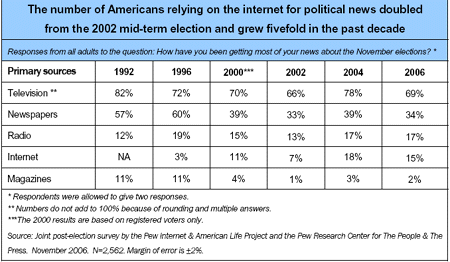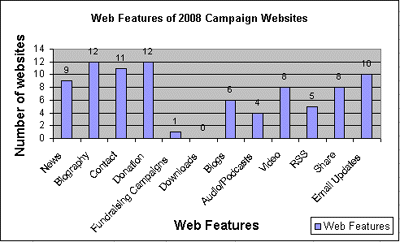The Pew Internet and American Life Project released a new study this week about trends in obtaining political news online. The results were pretty interesting, but predictable, given the rise in user-generated Web content. Here is a summary of some of the study's important points:

This study clearly shows that the Internet has become a premier source of political campaign information. The results beg an important question: how are potential 2008 presidential candidates making use of this growing dependence on the Web for political information?
To answer this question, I decided to take a close look at 12 websites: these site belong to politicians who have officially announced their 2008 candidacy or who have formed presidential exploratory committees. I conducted the survey much the same way as I did our original campaign study, altering the criteria somewhat and keeping in mind that many of these sites are probably placeholders for future content and are not yet fully populated.
Here is what I found:

Overall, I think these websites are a great start for the 2008 presidential campaign, and, for the most part, are an indication that politicians are maybe starting to "get it". I was shocked to find the following quote on Tom Vilsack's site:
"But while a lot of campaigns think they are innovative because they slap up some YouTube video on their website and talk at people, our campaign’s desire is to embrace the greatest gift this medium gives political discourse: the ability to participate in two-way communication on a mass scale. "
It's like these potential presidential candidates had a collective "eureka" moment.
Here are some interesting points about the websites:
Overall, it is safe to say that the majority of these sites are better-designed and far more robust than their 2006 counterparts. We didn't see any of these specific features on the 2006 Senate campaign sites, and I can only expect that these sites will improve as races become more defined. It will be interesting to see how the various online tactics play into next year's race.
Click here to view the research data sheet with an explanation of feature criteria.
Sign up today to have our latest posts delivered straight to your inbox.